confederate flag

I’ve interviewed celebrities and entertainers before, and my main complaint is always this: They tend to dodge tough topics, which then results in pretty dull conversations.
So when I got on the phone with Christian hip-hop artist Dylan Phillips, whose stage name is nobigdyl., I thought getting him to say anything interesting would be about as hard as fishing for catfish.
But I didn't have to fish long before I realized that nobigdyl. was more than willing to tackle difficult subjects.
OUR AUGUST 2020 article “Harboring a Culture of Hate,” by Catholic scholar-activist Eric Martin, contended that since the U.S. Catholic bishops did not explicitly condemn the Confederate flag as a symbol of hate—the bishops’ committee said “some still claim it as a sign of heritage”—some Catholics believe it is acceptable to be both Catholic and a member of white supremacist movements. Some Catholic officials and laypeople called the article misleading, saying it unfairly downplayed the institutional church’s other important anti-racist work, and Sojourners’ president Jim Wallis, who was then also editor-in-chief of our publications, decided to remove the article from our website.
Two weeks later, after some of the most intense and voluminous reaction in our publishing history, we issued a correction and reposted the article—and we’ve made some significant structural changes as well, instituting new policies that establish editorial independence from our organizing work (our new editor-in-chief Sandi Villarreal explains the importance of editorial independence). We’ve received hundreds of responses from our readers—including ordained and lay Catholic leaders, journalists, scholars, and activists—a sampling of which is below. As always, we appreciate your honest and passionate engagement, and we promise to keep listening.

A Red Flag?
Regarding the Episcopal church called “The Cathedral of the Confederacy” (“Robert E. Lee Worshipped Here,” by Betsy Shirley, April 2017): Token efforts of repentance such as the removal of the Confederate flag will not suffice; full biblical repentance requires massive restitution in order to repair the enormous oppression and damage done to African-American people over the centuries.
Lowell Noble
Riceville, Iowa
Spoiler Alert
It’s always great to read about an entrepreneur who shows that justice can be good business (“Grocery Store Inequity,” by Courtney Hall Lee, April 2017). I was interested to read of Jeff Brown’s effort to introduce quality, convenient shopping to low-income areas of Philadelphia because I lived in the southwest Germantown part of that city for two years back in the mid-1980s. I quickly noticed, when visiting the suburbs, that perishable food was much more plentiful and varied and lasted longer than food I bought at the “supermarket” a mile away from my apartment. One can only suppose that low-income folk did not find expensive, quickly spoiled food appealing and, since they didn’t buy it, healthy, fresh food was harder and harder to get. People are too often blamed for their own poor health habits. Please keep informing about the barriers faced in the name of “just business.”
Ann Larson
Essex, Vermont
Spivey’s Still Got It
Regarding “The Trump Presidency, One Year Later,” by Ed Spivey (April 2017): I laughed so many times that my wife wanted to read it! I think humor may be one of the best antidotes for the toxicity of our times. Spivey’s humor is also self-deprecating, which is more effective than the self-righteousness I feel and express so often. Thank you, Ed, for making us laugh while reminding us that we have all sinned and come short of the glory of God.
Charles R. Crawley
Cedar Rapids, Iowa
Don’t Discount Adam Smith
Several points from your interview with Chuck Collins (“Wealth and the Common Good,” March 2017) illustrate the compatibility of his ideas with the economic system of capitalism proposed by Adam Smith. Smith sharply criticized stark economic inequalities. He advocated good wages for workers, writing that efficiencies in the division of labor made it possible to spread wealth even to the lowest ranks of the people. He advocated progressive taxation. And he argued that people were the same—no “myths of deservedness” for Smith. Finally, while Smith did not say anything about campaign finance reform, his excoriating comments on the political power of the wealthy are potent. The clear inference is that the wealthy should not have disproportionate electoral power.
For too long, American political discourse has featured a false dichotomy between capitalism and socialism. This dichotomy has been based on a gross distortion of Smith’s system. It is time to change the conversation to what kind of capitalism would be best for the country and the world: the savage capitalism of recent decades, or the capitalism with justice and equal opportunity that Smith advocated.
John E. Hill
Quincy, Massachusetts
“But what about ...?” Write to letters@sojo.net or Letters, Sojourners, 408 C Street NE, Washington, DC 20002. Include your name, city, and state. Letters may be edited.
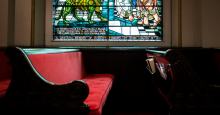
IN A SERMON that lasted less than 11 minutes, Rev. Wallace Adams-Riley suggested something no one had said from the pulpit in the long history of St. Paul’s Episcopal Church in Richmond, Va.
“What if,” asked Adams-Riley in his faint South Carolina drawl, “we begin a conversation here at St. Paul’s about the Confederate symbols here in our worship space?”
He listed examples: “The Davis window there, that identifies Jefferson Davis with St. Paul himself, in his imprisonment. Or the Lee windows there, that identifies Robert E. Lee with Moses,” he said, pointing around the sanctuary. “And there are the plaques on the walls, and two kneelers up by the old high altar. They [the kneelers] each have a little Confederate flag on them.”
The sermon was remarkable in its restraint. It wasn’t a jeremiad against the church that had, up until the 1960s, emblazoned its official stationery with “Cathedral of the Confederacy.” Nor did it mention the words that would ripple through the congregation in the months that followed, words like “racism,” “slavery,” and “reconcile.”
In fact, there weren’t many words at all. Adams-Riley’s preaching style is spare and impressionistic; his tone, much like his personality, gentle and encouraging. He quoted the Wisdom of Solomon: “The generative forces of the world are wholesome, and there is no destructive poison in them.”
“Generating. Building up. Giving life,” repeated Adams-Riley. “Strengthening. Healing. Bringing wholeness. That is what God does. And we, being made in God’s image, find our greatest fulfillment in doing likewise.”
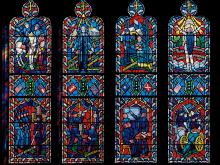
But the officials said their decision-making process concerning the windows sped up after the violence in Charlottesville, Va., last month, when neo-Nazis clashed with counterprotesters. But they also acknowledged that the windows’ removal is not sufficient for addressing racial injustice.

Can you imagine one of the white supremacists in Charlottesville, Va., making this same argument for the swastika, somehow trying to suggest that it isn't a display of hate but of the heritage of the ancient Hindu principle of "making of goodness"?
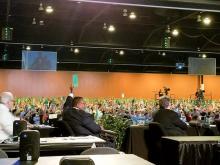
After a fierce backlash on social media, Southern Baptists reversed course and adopted a statement denouncing “alt-right white supremacy,” calling it “antithetical to the Gospel of Jesus Christ.”
The unusual move on June 14 was a shift from the previous day, when the Southern Baptist Convention’s Resolutions Committee declined to bring to a vote a Texas pastor’s proposed resolution condemning the “alt-right” movement, whose members include white supremacists.

For Russell Moore, whose sharp criticisms of Donald Trump voters nearly cost him his job as the public voice for America’s largest Protestant denomination, the path to regaining a prophetic platform is just beginning.
Moore started down that trail this week. After apologizing for being “unnecessarily harsh” during the campaign, he received a vote of confidence from the executive committee of the Ethics and Religious Liberty Commission, the public policy arm of the Southern Baptist Convention.
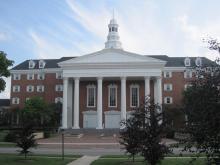
Exit polls suggest 81 percent of white evangelicals voted for President-elect Donald Trump.
But support for Trump may have been less decisive on Christian college campuses, where most students are also white evangelicals.
A Washington Post/ABC News poll, before the election, found the views of younger adults do not align with some older ones, when it comes to their beliefs about Trump supporters.

After quietly removing panes bearing the Confederate flag from its stained-glass windows, leaders of the Washington National Cathedral are now wondering what to do about remaining images of Confederate generals Robert E. Lee and Stonewall Jackson.
"How can you justify having those windows in a house of God?" challenged Riley Temple, a former board member of the Washington National Cathedral's foundation.

The two panes bearing the image of the flag were replaced last month with red and blue panes to match surrounding glass, said Kevin Eckstrom, chief communications officer for the cathedral. Adjoining panes honoring Confederate generals remain in place but “their long-term future is really very much up in the air,” he said.
Eckstrom said on Sept. 28 that he learned of the change in the windows the day it occurred — Aug. 26 — when an architect met with members of a cathedral committee who quickly decided on the specific replacement glass.

At Washington National Cathedral on Sunday, an interracial group of clergy gathered to discuss the role of the white church in perpetuating racism. And what the church might do to heal the wounds. A tough subject, but dealt with unflinchingly
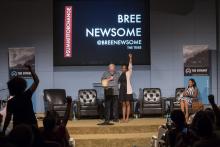
Bree Newsome, a Christian activist from North Carolina, climbed into history last year when she scaled the flagpole of the South Carolina state house and removed the longstanding Confederate flag. One year later, Sojourners caught up with Newsome, an honoree at The Summit 2016, on what her action helped bring down — and build up.
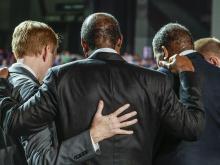
In recent years, Southern Baptists have made racial reconciliation a top priority.
This week, delegates (called “messengers”) to the SBC’s annual meeting in St. Louis overwhelmingly passed a resolution urging Christians to “discontinue the display of the Confederate battle flag.”
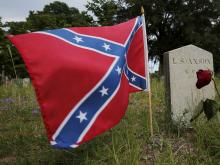
The Southern Baptist Convention, born in 1845 in a split over its support for slavery, passed a resolution calling for Christians to quit using the Confederate flag.
“We call our brothers and sisters in Christ to discontinue the display of the Confederate battle flag as a sign of solidarity of the whole Body of Christ, including our African-American brothers and sisters,” reads the resolution adopted Tuesday at the convention’s annual meeting in St. Louis.
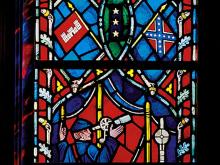
The Washington National Cathedral will replace depictions of the Confederate flag in its stained-glass windows with plain glass but maintain adjoining panes honoring Confederate generals for at least two years while it fosters discussions about the church and race relations.
The board of the cathedral announced the decision June 8, almost a year after the South Carolina governor ordered the Confederate flag be removed from its statehouse grounds. The governor’s action followed the fatal June 17 shootings of nine members of Emanuel African Methodist Episcopal Church in Charleston, S.C., by an alleged perpetrator known for embracing the flag.
Speaker of the House Paul Ryan has said repeatedly that he isn’t running for president, but that hasn’t stopped him from making numerous public appearances to talk about his vision for the Republican Party and the United States.
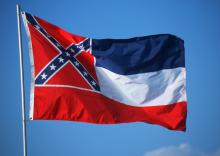
Campus police officers at the University of Mississippi removed the state flag from its campus this morning, days after resolutions from the student body, staff, and faculty urged such action, according to a press release from the University of Mississippi.
It is the first predominantly white institution of higher education in the state of Mississippi to ban the flag.
The student senate was the first to pass the resolution, after 3 hours of "respectful and impassioned debate" culminating in a 33-15-1 vote in support of removal.
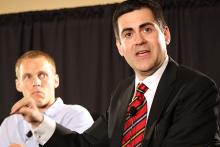
Russell Moore, president of the Ethics and Religious Liberty Commission of the Southern Baptist Convention, is in the spotlight after interviewing former Florida Gov. Jeb Bush and Florida Sen. Marco Rubio at an evangelical conference in Nashville on Aug. 4. Moore spoke with Religion News Service’s Jonathan Merritt about a range of pressing issues and the message of Moore’s new book, Onward: Engaging the Culture Without Losing the Gospel.

Four Confederate flags were placed outside of Rev. Martin Luther King Jr.’s church here July 30. Authorities said they are looking for two white men who were caught on surveillance video.
Authorities have images of the men placing the flags outside Ebenezer Baptist Church in Atlanta, said Atlanta Police Chief George Turner.
Local authorities are working with federal authorities and have not determined what charges might be levied, he said. They have not ruled out a hate crime, Turner said. An officer from the Atlanta FBI’s joint terrorism task force was on the scene “to better determine if any specific threats were received” and to provide support to Atlanta police, FBI Special Agent Steve Emmett said in an email.